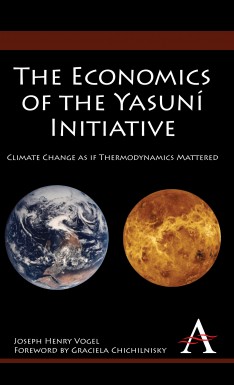The Economics of the Yasuní Initiative
Climate Change as if Thermodynamics Mattered
By Joseph Henry Vogel
Foreword by Graciela Chichilnisky
Prologue by José Manuel Hermida
- About This Book
- Reviews
- Author Information
- Series
- Table of Contents
- Links
- Podcasts
About This Book
Climate change and the intertwined extinction crisis lend themselves to political economy. Joseph Henry Vogel has constructed an argument for bringing the carbon-rich but economically poor countries through the bottleneck of a cowboy economy and into the 'cap and trade' Annex I countries of the Kyoto Protocol. Ecuador serves as the example. ‘The Economics of the Yasuní Initiative’ is a counterpoint to ‘The Economics of Climate Change’ by Sir Nicholas Stern on many levels. At the most basic level, Vogel argues that Stern is wrong for his failure to recognize the nature of climate change as thermodynamic, thereby missing the point of Northern appropriation of the atmospheric sink. The switch to thermodynamics brings into focus the legitimacy of a 'carbon debt’ that starts to tick with the first report of the IPCC in 1990. Through the lens of economic theory, the understandable intransigence of poor countries to assume the 'cap' in 'cap and trade' is a distortion to the economic system. But by that same economics, one distortion can justify another. That other distortion is the payment Ecuador seeks for not drilling in the Yasuní Biosphere. Heeding the call of Deirdre (formerly Donald) McCloskey that economics needs more humor, Vogel has written a scathing critique of economics-as-usual which also entertains.
Reviews
'…[R]efreshing and persuasive…pos[ing] important questions for mainstream economics and co-operation theory…a call to arms for the use of multiple, radical means to mitigate climate change.' —‘International Journal of Environmental Studies’
'A springboard for a succinct, passionate exploration of the economics of anthropogenic climate change… It does what all good books should do: it makes you think.' —Doug Macdougall, Professor Emeritus, Scripps Institution of Oceanography and author of ‘Nature's Clock: How Scientists Measure the Age of Almost Everything’
'In the present stalemate over climate change, new ideas are welcome. Vogel's presentation of the economics of the Yasuni Initiative is worth serious consideration.' —Peter Singer is Professor of Bioethics at Princeton University. His books include ‘Animal Liberation, Practical Ethics, One World, The Ethics of What We Eat’ and ‘The Life You Can Save’
Author Information
Joseph Henry Vogel is Professor of Economics at the University of Puerto Rico-Río Piedras and serves on the International Tribunal of Climate Justice.
Graciela Chichilnisky has worked extensively in the Kyoto Protocol process, creating and designing the carbon market that became international law in 2005.
Series
Anthem Environmental Studies
Table of Contents
Prologue by José Manuel Hermida; Foreword by Graciela Chichilnisky; Introduction; Acknowledgments; Abbreviations; Chapter 1: Thermodynamics: The Language Chosen Defines the Debate; Chapter 2: The Tragedy of the Commons: A Class of Problems that has no Technical Solution; Chapter 3: The Willful Ignorance of Realpolitik: Market Failure or Cost-shifting Success?; Chapter 4: The General Theory of Second Best: A Rigorous Justification for an Intuitively Just Proposal; Chapter 5: Through the Bottleneck of a Cowboy Economy: Financing Shovel-ready Projects; Conclusions: Reason for Hope and Despair; Appendix: Annotated YouTube Filmography; Notes; Index
Links
Stay Updated
Information
Latest Tweets



